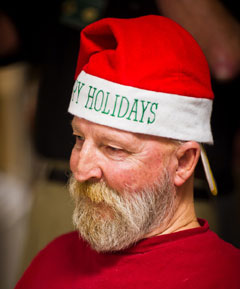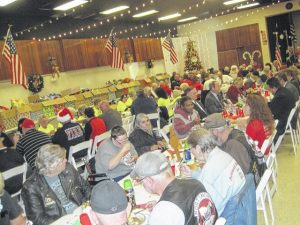You Numbah Ten!
Choi Oi!
White Mice …
Victor Charlie …
You buy me Saigon tea? …
The “NamVet” words he’d heard every day while he was serving in the Vietnam War, 50 years before, ran randomly through Brad Harper’s brain as he drove with his wife Patty toward the Los Angeles auditorium where a special reunion of 1st Infantry Division veterans was being held, on the morning of Christmas Eve (of all times! But then, this was California).
Brad and Patty had both been outraged when they learned that the long-awaited reunion was to be a Christmas Eve breakfast buffet one. “For Christ sake, don’t they know that most of us NamVets have children, AND grandchildren, we’ll want to be spending Christmas with?” fumed Brad when the invitation arrived a few weeks before. But it included an apology and an explanation: There had been difficulty in getting the reunion planned, and as a result the only remaining available time before the end of the year, at that large auditorium, proved to be Christmas Eve. But don’t worry, faithful veterans, the invitation went on: We promise we’ll have you out of there by noon!
“Yeah. Everybody that believes that, go stand on your head,” Brad snorted when Patty pointed it out to him. But she said, “Well, hon, this may be the very last time you get to see most of your old Vietnam buddies. You and I ARE both 71, you know!”
So, they went, with Brad still mumbling imprecations at the founders of the feast, but secretly excited that he might get to see some of his friends from the Public Information Office again. They had been stationed at the Big Red One’s division headquarters at Di An, about 20 miles northeast of Saigon, and they had seen some horrifying things, although none of them was ever in direct combat.
Like George “Bushy” Adkins, nicknamed because of his vast mane of thick black hair. He had been out in the jungle on one news-gathering trip, and, while a passenger in an ARVN (Army of Vietnam) helicopter, had witnessed the official interrogation methods of the ARVN with captured Viet Cong. “They were questioning this one guy in the helicopter, and he was saying quite a bit in reply, although of course I couldn’t understand them,” Bushy related later. “When they’d apparently gotten all the info out of him they thought they’d be likely to get, the lieutenant who was questioning him, just shoved him out the open door of the chopper! I can still hear him screaming as he fell to his death in the jungle!”
Bushy had a hard time, a long time, getting over his witnessing of that. After all, these PIO guys were writers, reporters, not line-infantrymen who were accustomed to being in the middle of blood and gore.
But Brad remembered another incident, that had left ALL the PIO guys shaken and grieving. It was the loss of the enlisted man among them who they all respected more than they did the sergeants and officers in their office.
Jim McKenzie was a draftee, a college grad who had had no thought of going into the U.S. Army. But once in it, he began to display qualities of industriousness, leadership ability, responsibility, reliability, and intelligence which showed him to have had all the innate qualities of an outstanding junior officer. Numerous men in the upper ranks bemoaned the fact that he had not gone into Officer Candidate School and BECOME an officer. But Jim had no desire to make the Army a career. He had been drafted; he had to serve two years. So he was going to do the very best job, AT his job, during that time, that he possibly could. That’s how he was raised, on a South Dakota farm.
And so, this outstanding enlisted man, who had given exemplary service and leadership in a war zone, and one week before his scheduled flight back to the U.S. to be mustered out at the end of his enlistment, was sent by Lt. Col. Frank W. Jamieson, in charge of the PIO, out to the boonies — that is, the jungle — with a line infantry outfit, to gather a few more stories for the American civilians back home.
Brad and the others among the PIO enlisted men were appalled, and fearful for Jim’s safety. He was so close to leaving this hell; so close to going back to his parents, and his fiancee, in South Dakota — and now this.
Brad was scheduled to leave Vietnam to return to the mainland just two days before Jim. As he was getting his stuff packed up the morning of his departure, horrible news came in from the field. The infantry outfit Jim was with had run into a Viet Cong ambush. Many GIs had died — and Jim apparently was one of them.
Details were sketchy as they came in. Brad and his buddies in PIO wept ope nly at the loss of their buddy — their leader in the ranks, the best man in the office. But when Brad boarded the plane at Tan Son Nhut for the trip back to Travis Air Force Base in San Francisco, the guys in PIO had heard no encouraging news — no hint that maybe Jim was still alive. And after Brad was back home, once more a civilian, he never heard from any of his Vietnam buddies again. In those days, there was no Internet, no Facebook,no easy way to check on the well-being of someone who lived many hundreds of miles away from you.
nly at the loss of their buddy — their leader in the ranks, the best man in the office. But when Brad boarded the plane at Tan Son Nhut for the trip back to Travis Air Force Base in San Francisco, the guys in PIO had heard no encouraging news — no hint that maybe Jim was still alive. And after Brad was back home, once more a civilian, he never heard from any of his Vietnam buddies again. In those days, there was no Internet, no Facebook,no easy way to check on the well-being of someone who lived many hundreds of miles away from you.
Brad grieved for his lost buddy, got through it, and went on with his life, going into the newspaper business as a reporter, meeting, falling in love with and marrying Patty, fathering their two children, watching them and guiding them as they grew up, moving into middle age, then retirement — and here he was now, about to meet some of his buddies again, those still living, that is, probably for the last time.
And as he and Patty neared the auditorium for the Christmas Eve reunion, another figure from his wartime past popped into his head.
Brad had once, during his service in Vietnam, been assigned to travel in an Army helicopter to a leper colony, some miles away from the base camp. The 1st Division Band was to appear there and play to entertain the patients — those not too ill to come out and attend, that is — and Brad was ordered to take notes and write a story about the event, and take along a camera so he could bring back some photos, too.
The division band played a selection of songs for the patients, who sat in chairs around the edges of the big tent where the concert was being held. They leaned forward, eagerly listening to the music, smiling, temporarily forgetting the loathsome disease from which many of them would die.
As Brad scanned his gaze around the crowd of patients, he suddenly made eye contact with a little boy, 6 or 7 years old, who was standing by his parents’ chairs. The child gave him a winning grin, which Brad returned. As the concert continued, Brad noticed that the youngster kept watching him, as if some bond had already formed between them. When it was nearly over, Brad sidled over to the Catholic priest who was in charge of the colony, and asked him about the boy. “Oh, his parents are both lepers; he was born here in the colony,” the French priest said. “He should have been separated from them at birth, as prolonged contact can transmit the disease. But they were so determined to keep him here, that I finally relented and let him stay. He is not affected by leprosy — not yet, anyway. There are a few other children here, but not many. He finds ways to amuse himself, and seems reasonably content. He is already asking me questions about the disease, whether there is a cure, and the like.”
Brad thanked the priest, and headed for the helicopter. But he looked back toward the boy one more time, as he accompanied his parents back to their living quarters. The child was still watching him, and smiling as if he knew a secret no one else did. Brad waved, and the boy reciprocated, enthusiastically.
When Brad arrived back at the PIO, he talked with Lt. Col. Jamieson about the little boy’s sad situation. He wanted to stay with his parents; but if he did, sooner or later he was likely to contract leprosy. The colonel agreed to talk with Gen. Carruthers, the 1st Division CG. The general, agreeing that the situation required action, contacted the French priest who was in charge of the colony, to see if some solution could be worked out.
And then, fate stepped in. The little boy’s parents (his name was Mai Duc), seeing that their leprosy was steadily growing worse, finally concluded that to protect their son, they would have to try to arrange for him to be adopted, or at least placed in an orphanage safely away from the colony. The French priest agreed with them, and in due course, little Mai Duc was transported to a Catholic-run orphanage in Saigon. Parents and child wept bitter tears; but they were promised that efforts would be made to bring their son back occasionally for brief visits.
Word filtered down to PIO at 1st Division headquarters, and when Brad learned that Mai Duc was now in the orphanage, he began seeking permission from Jamieson whenever possible, to check out a jeep from the motor pool and drive down to Saigon to visit who had become his good li ttle friend. Usually, if Brad wasn’t needed at the office for a few hours, the colonel would let him go.
ttle friend. Usually, if Brad wasn’t needed at the office for a few hours, the colonel would let him go.
And the young U.S. Army Specialist Four, and the even younger Vietnamese boy, became fast friends. Mai Duc quickly learned English from his mentor, and proved to be a very smart, very witty kid. Brad taught him to play checkers; Mai taught Brad a limited command of Vietnamese. They played ping-pong several times in the orphanage dayroom.
When Brad’s ETS (date of leaving the Army) approached, and Brad had to tell his little friend that he wouldn’t be able to come see him any more, poor Mai broke down and cried, and cried, hugging Brad and saying, “Brad buddy, Brad buddy, you numbah one! You numbah one!” It was the ultimate Vietnamese tribute to an American GI, expressed in fractured but sincere English.
Dinky dau!
FNG!
Mama San!
Papa San!
You buy me Saigon tea?
Fuck-you lizzard
Brad and Patty walked from the parking lot into the VA auditorium where the Christmas Eve reunion was scheduled. Yuletide decorations were displayed everywhere — trees, wreaths, Manger scenes, a large, jolly Santa who made his way around through the crowd, wishing everyone a “Merry Christmas! And thanks for your service!”
The arrangers of the event had various terms of service in Vietnam written on banners displayed over each long table. “Good thinking on that,” Patty said, looking around. “Here, Brad; here’s 1965-’66 over here.”
They moved toward the table, with Brad studying the few veterans — and their wives or girlfriends — already there. He didn’t see anyone familiar.
Until one old veteran with a short white beard and mustache, wearing a “Veterans’ Christmas” cap, looked up, centered his gaze on Brad’s face for a few seconds, then suddenly jumped up and cried, “Brad Harper! You old son of a gun! Where you been the last 50 years?!” Brad returned his gaze for a few seconds, then his face lit up and he shouted, “Bushy! How the hell you doin’, fella?” The two clasped hands, hugged each other like long-lost brothers, and Patty noticed when they separated that tears were streaming down each weathered cheek.
They began chatting, and the next time Brad addressed his old buddy as “Bushy,” the other veteran laughed loudly and said, “I ain’t ‘Bushy’ any more!” He pulled off the cap, showing a completely bald pate, without even a fringe left. Both men — and Patty, too — got another big laugh out of that.
The veterans across the big auditorium had begun eating their Christmas breakfast when Brad, Bushy and Patty suddenly heard a voice from behind them: “Don’t pay the ransom! I escaped!”
Patty turned around first, seeing a man about the same age as the other three, leaning on a cane as he hobbled toward them, a few facial scars visible. Patty had never seen him before.
Brad and Bushy turned around, looked — and both froze in shock for a few seconds. Then they yelled in unison, “Jimmy! Jimmy McKenzie! Man, we thought you were killed in that VC ambush!” McKenzie laughed. “Everybody thought I was — including me, for a while! But the docs finally pulled me through. Had permanent leg damage and these scars you can see, though.”
The three old veterans had a brief, emotional group hug that brought tears to Patty’s eyes. Then they began trading “NamVet stories” about their service 50 years before.
As the many tablesful of veterans were finishing their Christmas Eve breakfast, a local VA official began introducing various speakers who took the podium to give brief but heart-felt praise to the veterans for their service, wish them a Merry Christmas, and the like. The four people at the 1965-’66 table listened casually, trading remarks and wisecracks about the speakers all the while.
The final speaker — the featured one, actually — was a distinguished-looking Oriental man, who appeared to be in his late 50s, was well-dressed and well-spoken. His name was announced as “Dr. John Sullivan.” Brad’s first thought was, “Humph! Must have been adopted by an American couple.”
Dr. Sullivan began giving a brief autobiography of himself. He had been born in a leper colony where his parents were patients, he said. At that, Brad’s ears suddenly perked up, and he sat up and stared hard at the speaker.
“What the — ” he thought. Could that be — ?
“I met a wonderful, very kind young American serviceman who helped get me out of the leper colony, for fear I would contract it, and found me a place in a Saigon orphanage. He was, in the short time we were together, the best friend I ever had. If he’s here anywhere, I’d like to say, ‘Thank you from the bottom of my heart, Brad Harper. You saved my life.’ ”
The four at the table couldn’t believe their ears. Patty, Brushy and Jim looked at Brad, and saw that he was crying like a baby, saying, “I can’t believe it! I just can’t believe it!”
Needless to say, when the event was over, the four rushed up to where Dr. Sullivan was still chatting with other veterans. Brad cried, “Mai Duc!” and the doctor’s head came up sharply. He looked around quickly, and when he spotted Brad, he shouted, “Brad buddy!” The two rushed into each other’s arms, with the doctor crying too, this time.
He told Brad that a young GI from the 1st Division and his bride had adopted him not long after Brad went home, and had raised him there in California, where he made top grades in school and eventually completed medical school to become an M.D.
The two chatted for quite some time, exchanging gossip on their respective careers, marriages, and so on, filling in 50 years as completely as they could. They exchanged phone numbers, e-mail addresses, and promises to visit each other.
And when they finally stood to say their (temporary) good-byes, and hugged each other again with genuine affection, the doctor put his mouth close to Brad’s ear and whispered: “You STILL Numbah One!”



4 comments for “A Christmas NamVet reunion”